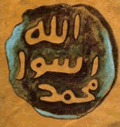DiamondHearts
Registered Senior Member
آپ کیسی ہيں؟
Unless that "some guy" established a religion practiced by 1.5 billion people (even 1,400 years after his death), conquered Arabia, and made the Arabs a superpower.
كيا بتا ؟
Had to use a be instead of pe I only have an Arabic keyboard.
We're talking about influential people. Any idiot can start a religion yes, but will his personal influence on it be felt after 1400 years? In 1.5 billion people? Not to mention the other 4.5 billion opinions on it?
Well, admittedly you need to choose your time and place carefully in order to ensure success for your new religion.
We'll just have to wait and see with Scientology, I guess.
Yeah, try being an illiterate man who embarks on second career in his forties in a dry desert area and goes on to convince a significant portion of the world about his beliefs.
Maybe you want to dig a little deeper.*************
M*W: I'm just curious, did Muhammad actually exist?
Did a historical Muhammad exist?
Muhammad is widely believed to have been born in 570 C.E. in Mecca. The earliest accounts we have of him date to 750 C.E. with the book Life by Ibn Ishaq, more than one hundred years after Muhammad's death. Although this is the first and most basic source for information about the life of Muhammad for all Muslims, it does not present a very flattering portrait of him. Even then, we don't have any original copies of Ibn Ishaq's work - we only have a later recension by Ibn Hisham (a recension is a critical revision of a text which incorporates plausible elements which can be found in varying sources). Because Hisham died in 834 C.E., that means that our earliest sources appear two hundred years after Muhammad died. Not even the evidence we have from the Sufyandi period, 661-684, makes any mention of Muhammad. Surviving papyri of that era say nothing, and the coins invoke only Allah, not his Prophet. As late as the second century of the Muslim era, scholarly opinion on Muhammad's birth date differed by as much as 85 years, demonstrating that even at that point there was a great deal of variation in what people knew about Muhammad. The focus on Mecca is also questionable. Muslim tradition teaches that Mecca was an important crossroads for trade caravans, but the location of Mecca today is not a natural stopping place for the incense route from south Arabia to Syria. Contemporary non-Muslims sources also don't make any mention of such a city, which is very strange if Mecca was indeed important for commerce and religion. By and large, it appears that the Muslim belief that we have accurate eyewitness reports for every aspect of Muhammad's life is not unlike similar beliefs among Christians regarding Jesus and Orthodox Jews regarding Moses. The motivation lies more in a need to believe than in a sound foundation based on confirmed historical evidence. Given that, the following description of Muhammad's life is based almost entirely upon the traditional beliefs of adherents and not upon historically confirmable fact.

I thought his wife was his scribe?
What was the name of that guy who invented television?
Farnsworth
Yeah, try being an illiterate man who embarks on second career in his forties in a dry desert area and goes on to convince a significant portion of the world about his beliefs. So that twenty years later, his influence has spread across a continent. And 1400 years later in 1.5 billion people who still believe in him.
